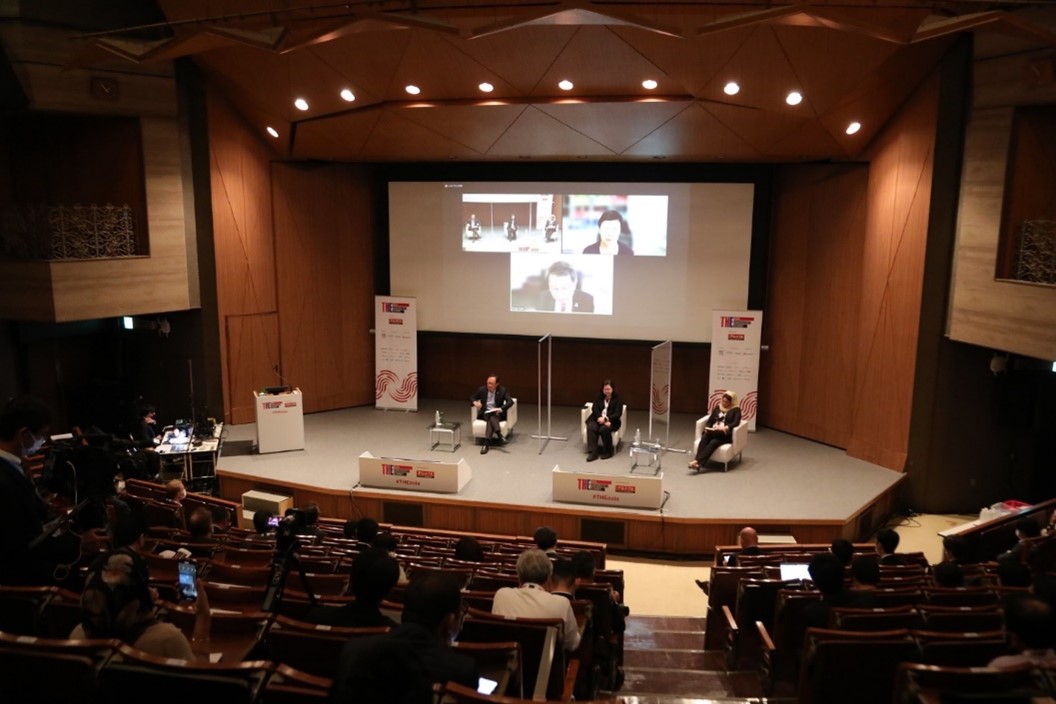
“A diverse community and a diverse leadership make for a much stronger community and organisation. In ways that we can, in all our different roles, to enhance and support that diversity, the better our organisations will be,” said Professor Lily Kong, President, Singapore Management University (SMU), at the Times Higher Education (THE) Asia Universities Summit on 1 June 2022.
Prof Kong was participating at the Summit in line with SMU’s strategic priority area of “Growth in Asia”, where the University sought to offer a deep understanding of Asia’s economy, polity and society. She delivered these insights during the panel discussion titled, “How can we develop university leaders for a VUCA world?”
Organised by THE in partnership with Japan’s Fujita Health University, the three-day Summit examined the role of the university in a rapidly changing world. Prof Kong’s fellow panellists included Prof Norzaini Azman, Professor at Centre of Education Leadership and Policy, Universiti Kebangsaan, Malaysia; Prof Santhaya Kittikowit, Assistant President of Chulalongkorn University, Thailand; and Prof Rocky Tuan, President, and Vice-Chancellor of the Chinese University of Hong Kong. The session, which was conducted in a hybrid manner, was moderated by Chairman of Elsevier, Mr Y.S. Chi.
Approaching the topic from the perspectives of ethnic diversity, women in leadership and cultural differences, each panellist drew from diverse experiences for a robust exchange of knowledge and ideas. Prof Kong offered her views on gender imbalance in Asian higher education leadership, proposing the following four key ideas for change to support more women in leadership roles:
- Creating awareness at both institutional and individual levels.
- Setting and meeting gender targets
- Providing support for women
- Devising and implementing policy
“Specifically, institutions could raise the awareness of gender bias among gatekeepers, such as the Board and among Deans, to identify champions and acknowledge their success in promoting women,” commented Prof Kong. “For individual awareness, we could provide women with the training, networking and mentoring opportunities to help them overcome self-limiting behaviours to fulfil their true potential. For example, we offer a Women and Leadership Programme in SMU, which specifically supports female executives in this aspect.”
Although it is debatable whether gender composition targets should be applied across the board, she urged institutions to take the necessary steps to devise and implement policies that would encourage equitable recruitment, retention, engagement and career progression.
Concurring, Prof Rocky Tuan commented on the importance of ‘role models’ in addition to legislative measures. “The role models do not always have to be women, but also men who would help to tell people and inform the upcoming generation,” Prof Tuan remarked.
In response to a question on the skills that future leaders would need in a volatile, uncertain, complex and ambiguous (VUCA) world, Prof Norzaini Azman opined that different leadership roles had different requirements. Prof Rocky Tuan observed that a true leader ought to be guided by kindness and compassion, which might be hard to measure, but can be nurtured from young.
Agreeing, Prof Kong elaborated, “Empathy is so critical in a VUCA world. Being able to climb into someone else’s shoes and walk around with them is what would provide us with perspective and allow us to lead. Also, a balanced approach to risk as the VUCA world is surrounded by risks and challenges. If we are risk-averse, we will never move. If we are too much a risk taker, we could be putting our institutions into jeopardy”.
During the hour-long discourse, the panellists also exchanged viewpoints on global recruitment, internationalisation and diversity. Fostering a culture of integration and inclusion, providing integral support and the idea of collaborative leadership were some other issues covered by the panellists.
Photo credit: THE
